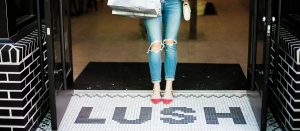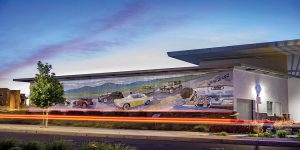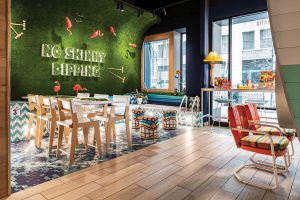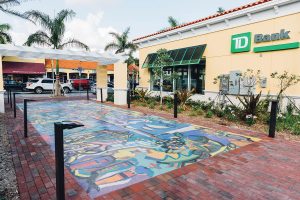— By Kait Paradowski —
The benefits of custom mosaics for F&B and retail applications.
In order to stand out from the competition, restaurants and retail spaces are seeking thoughtful ways to create memorable experiences and touchpoints for patrons and shoppers to take part in and interact with while perusing store aisles or having a bite to eat. One way owners, operators and designers are helping customers immerse themselves into a brand is through art and, more specifically, custom mosaics. Thanks to modern technology, mosaic designs can be made efficiently and incredibly detailed, bringing brand stories and art to life. Tile mosaics are loved for their highly durable, easy-to-clean and fully customizable qualities, making them perfect for food, beverage and retail spaces looking to forge emotional connections with those walking through the door. These first impressions become lasting ones, encouraging customers to return and bring others to experience the same engagement.
Custom Artwork

Kait Paradowski, Artaic
A unique way to create these impressions is through custom mosaics. Thanks to technology, we are now able to transfer any logo, image or inspiration source into the mosaic medium to create designs that are often a reflection of the brand ethos, an attribute to a theme, or a tie back to a specific community or location. These “memorable moments” are essential, bridging the gap between in-person experiences and digital. Many shoppers or diners seek out places with “Instagramable” spaces which not only allow for the design to become a destination worth visiting but also call attention to the brand and/or its location. Because of mosaic’s versatility and durability, these designs can be incorporated in a variety of places and applications — walls, floors, bathrooms, pools, spas — the list goes on for brands to leave their mark.
Brand Storytelling and Logos
 Text, color, slogans and overall branding are how brands communicate with customers and are the identifiers for the brand’s product, space or service. So, it comes as no surprise that branding is top of mind when designing a space. Mosaics can bring an artistic look to logos and brand ethos within retail and hospitality spaces. Larger chains and big box stores tend to see designs that follow the corporate standard, continuing the brand story in all their spaces using a distinguishable brand identity. With its fully customizable options, tile mosaics are a unique way to update branding, encourage a design narrative and tell a story in a space.
Text, color, slogans and overall branding are how brands communicate with customers and are the identifiers for the brand’s product, space or service. So, it comes as no surprise that branding is top of mind when designing a space. Mosaics can bring an artistic look to logos and brand ethos within retail and hospitality spaces. Larger chains and big box stores tend to see designs that follow the corporate standard, continuing the brand story in all their spaces using a distinguishable brand identity. With its fully customizable options, tile mosaics are a unique way to update branding, encourage a design narrative and tell a story in a space.
Community Ties
Artwork with scenes and elements depicting the local community, as well as pieces commissioned by a local artist or artisan that supports the theme of the space have become sought-after ways to liven up a space as artwork adds character and provides a local connection. When vacationers dine at a local restaurant or a consumer stops at a local store, they want an authentic experience with touchpoints that bring them back to the surrounding environment. We see this often in new flagship stores in popular cities that are aiming to create a unique brand experience, or bring aspects of local history and storytelling inside. In New York City, for example, we see many brands use classic subway tile art as the inspiration for their mosaic, paying homage to the history of their city.
 Public art is another way brands can marry their community with the design scheme. Using the walls of the establishment to beautifully represent the community and their business offers local artists real estate for their artwork to be displayed through mosaics. Tile mosaic installations are a popular choice for exterior installations due to their durability and ability to remain vibrant and colorful after many years of exposure to the sun and inclement weather.
Public art is another way brands can marry their community with the design scheme. Using the walls of the establishment to beautifully represent the community and their business offers local artists real estate for their artwork to be displayed through mosaics. Tile mosaic installations are a popular choice for exterior installations due to their durability and ability to remain vibrant and colorful after many years of exposure to the sun and inclement weather.
Threshold Designs
 When stepping foot inside a store or eatery, one enters the threshold design area or the “decompression zone.” This is a crucial space as the design sets the tone as customers walk through. Mosaics are commonly used as part of these threshold designs to greet guests and introduce them to the space in a visually enticing way. For instance, as a cleaner and safer alternative to a rug or carpet, a mosaic threshold design can feature brand logos, slogans or a custom design that will withstand heavy foot traffic and, for retail and hospitality, that is a must. Tile mosaics are amongst the toughest and longest-lasting materials to use, as well as one of the easiest to clean, keeping the entrance looking eye-catching and welcoming all at once. Custom art in the entryway creates a captivating entrance that spans from the floors to walls with custom imagery or a playful color story that gains the attention of patrons upon entry. Here, there is an opportunity to wow consumers as they enter a store or restaurant with a visual element that is much more impactful than standard vinyl or welcome signage that interrupts the flow of incoming guests.
When stepping foot inside a store or eatery, one enters the threshold design area or the “decompression zone.” This is a crucial space as the design sets the tone as customers walk through. Mosaics are commonly used as part of these threshold designs to greet guests and introduce them to the space in a visually enticing way. For instance, as a cleaner and safer alternative to a rug or carpet, a mosaic threshold design can feature brand logos, slogans or a custom design that will withstand heavy foot traffic and, for retail and hospitality, that is a must. Tile mosaics are amongst the toughest and longest-lasting materials to use, as well as one of the easiest to clean, keeping the entrance looking eye-catching and welcoming all at once. Custom art in the entryway creates a captivating entrance that spans from the floors to walls with custom imagery or a playful color story that gains the attention of patrons upon entry. Here, there is an opportunity to wow consumers as they enter a store or restaurant with a visual element that is much more impactful than standard vinyl or welcome signage that interrupts the flow of incoming guests.
Current Trends in Retail and Hospitality
 Today, we are seeing mosaic tiles take shape as hand-cut mosaics that allow for details, curves and movement to show through in art, logos and text-heavy designs. While color palettes are heavily influenced by the brand, we’ve noticed a shift towards warm-colored tiles as hospitality and wellness spaces, for instance, aim to achieve a feeling of calm and tranquility.
Today, we are seeing mosaic tiles take shape as hand-cut mosaics that allow for details, curves and movement to show through in art, logos and text-heavy designs. While color palettes are heavily influenced by the brand, we’ve noticed a shift towards warm-colored tiles as hospitality and wellness spaces, for instance, aim to achieve a feeling of calm and tranquility.
All brands approach the interior design for new stores and restaurants, as well as those they are renovating, differently. Today, competition is fierce and owners and operators have to do everything they can to set their space apart from the rest. Mosaic tiles offer customized options and a way for a brand to express itself visually. A true storyteller, mosaics are a thoughtful way to infuse art into a space while telling the brand’s narrative to those wanting to shop or dine and through a medium that will maintain the brand story for years to come.
— Kait Paradowski is design director of Artaic, which designs and fabricates custom, award-winning tile-work. Artaic modernizes the creation of architecturally compelling mosaics through fast design iterations, free sampling and American robotic production. For more information, visit https://artaic.com/.

